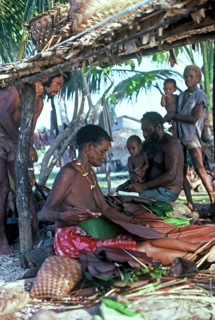Fishing the Passage Alata Prior to WWII
The net owner would organize his own clansmen to be in the two large canoes--typically for 20 men--that carried and set the giant net. Smaller canoes were allowed to join in and form the flotilla. One large canoe let out the net about half way then paid out the rest of the net to the other canoe. As the two large canoes encircled the alata, a couple of men would jump down into the sea at either end of the net, setting the circle’s slopping bottom, and report on the quality of fish inside.
 A net haul was big enough to be measured by the number of 10-man canoes--ae garua--filled with fish. The net owner would divide the catch. Those who went out to the reef earned the biggest portion of fish, although the abundance was shared among all village families. Except for the dangerous garfish, once a fish was pulled out of the net and was flipping around inside a canoe it was forbidden for someone to claim it. Returning to the village, each fisherman carried some fish to the tohi--prayer house--where they roasted the smaller ones and boiled the larger ones as a sacrifice to the spirits, including Jesus who leads the ancestors once they were missionized by the Anglicans. Regardless of clan, all village men could partake in the offering, but not women. Then the net owner divided up the uncooked catch.
A net haul was big enough to be measured by the number of 10-man canoes--ae garua--filled with fish. The net owner would divide the catch. Those who went out to the reef earned the biggest portion of fish, although the abundance was shared among all village families. Except for the dangerous garfish, once a fish was pulled out of the net and was flipping around inside a canoe it was forbidden for someone to claim it. Returning to the village, each fisherman carried some fish to the tohi--prayer house--where they roasted the smaller ones and boiled the larger ones as a sacrifice to the spirits, including Jesus who leads the ancestors once they were missionized by the Anglicans. Regardless of clan, all village men could partake in the offering, but not women. Then the net owner divided up the uncooked catch.
Since the 1930s, the relatively small population of Fanalei could only own and operate one large custom net at a time, while Walande has enough men to operate two. Custom nets were made of inner bark and took several years to role the line and knot the mesh. Yet the massive net lasted just one year. Net ownership on Fanalei rotated from one clan to the next, all clans participating in net ownership. Fanalei only set their large custom net about four times a year for feasts. The net owner who wished to fish a particular alata had to ask permission of the alata “owner” and pay one fathom of red shell money or promise the owner’s wife a large share of the catch that she could market. Bush villagers--who fished little themselves even in 1980--competed with each other over whatever fresh fish or dolphin meat is traded at the Passage markets on the mainland. Bush people would “sing out” the arrival of the saltwater women paddling in their canoes laden with catch. Both bush men and women exchanged their garden and bush products eagerly for the fish.








